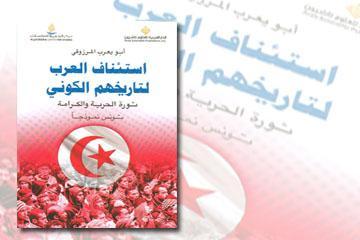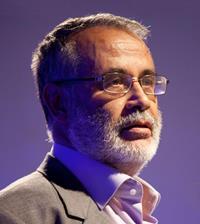
 |
As part of the Al Jazeera Paper series, Al Jazeera Center for Studies published a book entitled The Arab resumption of their universal role: The revolution for freedom and dignity: Tunisia as a model [Isti’naaf al-’Arab li dawrihim al-kawni: Thawra al-hurriya wa al-karama: Tunis namoothajan] by Dr Abu Ya’rub Al Marzouki.
The book consists of an introduction, six chapters and an appendix. Chapter One discusses the message of the revolution; Chapter Two the techniques used to abort it. The third chapter is dedicated to the conditions necessary to safeguard the revolution, while the fourth chapter introduces political concepts related to constitutions. Chapter Five is titled ‘The counter-revolution’; and Chapter Six tackles the concepts of genuine versus fake modernity.
Al Marzouki analyses the factors that drove the Arabs to resume their universal history, citing the Tunisian revolution as the baseline of this analysis, outlining the reasons that led to the outbreak of the revolt in Tunisia, in both concrete and symbolic terms. Marzouki argues that the events in Tunisia and Egypt will serve as models to follow in other Arab republics, noting that countries characterised by the strongest contradictions between the past and the envisioned future will experience revolutions first. He also maintains that what happened in Morocco and Jordan will be models for other Arab monarchies.
Summarising the revolutionary state in the Arab region, the author notes that revolutions seek not only internal and external liberation, but also involve a universal revolution against internal and external enslavement.
Synopsis (back cover)
History is unpredictable and full of surprises, chaotic events and messy implications, especially in terms of the unfolding of events, and their geographic spread. Furthermore, those who determine history belong to every stratum of the social hierarchy. This chaos sheds darkness on the life cycle of groups, both concretely and symbolically. The history of civilisation is governed by the relations between these dimensions, some of which are obvious, even to laypeople, while others are vague, even for scientists.
Discussing historical implications and philosophy can be viewed as a luxury, and is not always accepted or welcomed, except by those who are dedicated to searching for knowledge and truth. It is necessary to ask questions about the reasons underlying historical events, and to attempt to detect the logic linking past events, whose implications are still being felt, with the future and its implications. The present is the interaction between past events and their implications in the future, where exceptional occurrences – such as those in the Arab world currently – will determine the course of history.
Book details
Title: Arabs resume their universal history: The revolution for freedom and dignity: Tunisia as a model [Isti’naaf al-’Arab li dawrihim al-kawni: Thawra al-hurriya wa al-karama: Tunis namoothajan]
Author: Abu Ya’rub Al Marzouki
Publisher: Al Jazeera Center for Studies and Arab Scientific Publishers Inc.
Number of pages: 287
Date of publication: 2012
Cover design by Sameh Khalaf
Author details
- Born in Benzart, Tunisia, in 1947.
- Professor of Arabic, Greek and German philosophy.
- Holder of the state doctorate in Arabic and Greek philosophy (1991).
- Served as professor of philosophy at the Faculty of Arts, First Tunisia University (1980–2006).
- While on secondment, he taught philosophy at the International Islamic University in Malaysia (2002–2005).
- Served as director of the translation institute in Tunisia, Beit El Hikma (1993–1991).
- Has more than 100 publications to his name, covering various issues related to Arabic and human thought, including book chapters, research papers, journal articles, articles in newspapers and websites.
- Authored more than 20 books in his field of specialisation and on general affairs from a philosophical and religious perspective.
